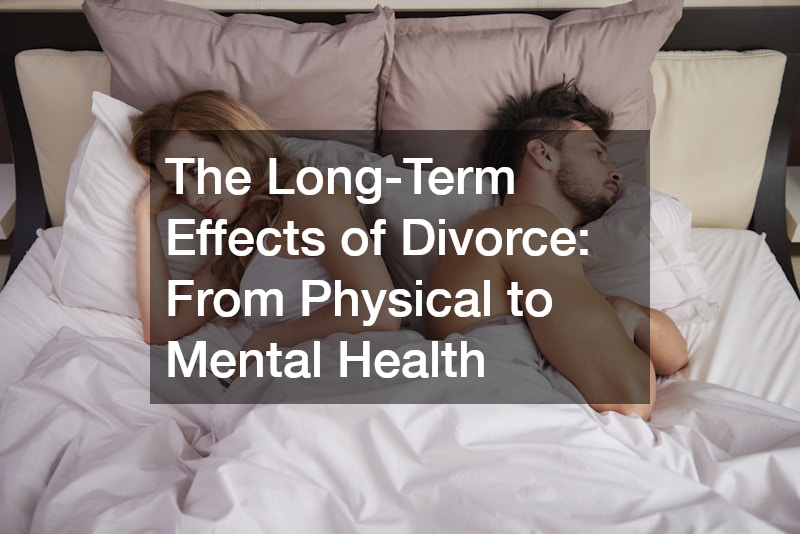
Divorce is a life-altering event that can have profound consequences on both physical and mental health. The emotional turmoil of ending a marriage can lead to stress, anxiety, and depression, but it can also affect one’s physical well-being. The Divorce Process can be overwhelming, and in some cases, its consequences extend well beyond the immediate separation, potentially impacting health and quality of life for years to come. For divorcing couples, understanding these potential effects—and how to manage them—is crucial for minimizing harm and building a path toward healing.
This article will explore the long-term effects of divorce, from physical pain to emotional distress, and provide actionable advice on how to mitigate these effects with the help of legal, medical, and mental health professionals. By recognizing the challenges of the Divorce Process, individuals can better prepare themselves for the emotional and physical toll that may accompany it.
1. Protecting Your Interests
A divorce lawyer plays a pivotal role in both the legal and emotional aspects of the divorce process. One of the most significant ways they help is by providing clarity during a time of overwhelming uncertainty. Divorce can be a highly complex and emotional journey, with decisions about custody, finances, and asset division affecting not only your future but also your mental state. A good divorce lawyer helps you understand the legal process, your rights, and the potential outcomes, which can significantly reduce the feeling of helplessness that many experience during such a tumultuous time. When you understand what to expect and have a clear path forward, it can provide a sense of stability amidst the chaos, allowing you to focus on healing.
Choosing a lawyer who specializes in high-conflict divorces or complex custody battles is important because these situations can escalate quickly and result in prolonged emotional distress. A lawyer with expertise in these areas knows how to handle the intricacies of such cases while minimizing the impact on your emotional well-being. Additionally, they can help craft strategies that protect your interests while reducing the overall emotional toll. For instance, a lawyer experienced in collaborative divorce or mediation can work towards peaceful resolution, rather than prolonged litigation. Mediation and collaborative methods focus on cooperation and compromise, which can prevent unnecessary escalation and encourage amicable solutions. These approaches reduce the emotional turmoil that often arises from contentious court battles, offering a healthier path forward for both you and your family.
2. Navigating the Emotional and Financial Aftermath

A family attorney’s role goes beyond just handling the legal paperwork and proceedings; they are also deeply involved in addressing the emotional and financial complexities of divorce. Custody arrangements, child support, spousal support, and asset division are not just legal matters—they have long-term emotional and financial consequences for all parties involved. For divorcing parents, decisions regarding custody can be especially challenging, as they directly affect the emotional well-being of children and parents alike. Similarly, financial decisions—such as the division of assets, debts, and alimony—can create financial instability or anxiety for the future. A family attorney who understands the emotional toll of these decisions, in addition to their legal implications, can help minimize the stress and make the process more manageable.
The emotional strain of negotiating financial settlements or child custody arrangements can escalate tensions, potentially resulting in feelings of anger, helplessness, or anxiety. This heightened stress can also take a toll on physical health, leading to sleep disturbances, gastrointestinal issues, or chronic headaches. The stress associated with fighting over these critical aspects of divorce can also trigger or exacerbate mental health issues like depression or anxiety disorders. In these instances, a family attorney’s role becomes even more critical—they help clients navigate these emotionally charged issues with care and attention, ensuring that both parties reach fair and amicable agreements. When the process is handled thoughtfully, it can reduce the emotional impact and allow the individuals involved to focus on healing and moving forward.
3. A Hidden Factor in Divorce

Divorce, in many cases, is not just a legal or emotional separation—it can also be the result of domestic violence, a factor that often goes unnoticed but significantly impacts the physical and mental well-being of those involved. Domestic violence, whether physical, emotional, or psychological, can leave lasting scars that go far beyond the end of the marriage. Survivors of abuse may struggle with a range of health issues, including post-traumatic stress disorder (PTSD), anxiety, depression, chronic pain, and in extreme cases, suicidal thoughts or behaviors. The emotional trauma of living with abuse can also manifest in physical ailments, such as gastrointestinal problems, headaches, or sleep disturbances, which can persist long after the divorce is finalized. Recognizing that domestic abuse is not just an isolated event but an ongoing challenge is essential for those going through a divorce under such circumstances.
If domestic abuse is part of your divorce, it is crucial to take immediate steps to protect yourself and your children. The first step is to seek legal protection, and a domestic violence lawyer can guide you through this process. A domestic assault lawyer can help you understand your rights and options, such as obtaining restraining orders, emergency protection orders, or other legal remedies that can offer immediate protection and help ensure your safety. This legal action not only shields you from further harm but also provides a framework for addressing custody and visitation rights if children are involved. It’s important to remember that legal protection is an essential first step, but it must be paired with emotional and psychological healing.
4. Recovering from Physical Injuries
Divorce is not only emotionally taxing but can also lead to physical harm, either directly or indirectly. The stress of going through a divorce—particularly a contentious one—can manifest physically in various ways. For some individuals, heightened anxiety and emotional turmoil may result in stress-induced conditions like muscle tension, headaches, or gastrointestinal issues. In more severe cases, the emotional strain of a divorce can increase the risk of accidents or physical injuries due to decreased focus, fatigue, or an inability to pay attention to personal safety. Additionally, if domestic violence is a factor, the physical injuries sustained during the marriage or in the aftermath of separation can require immediate medical attention and long-term care.
If you suffer from physical injuries during or after your divorce, seeking legal representation from a personal injury lawyer is an important step in recovering compensation for your medical expenses, lost wages, and pain and suffering. Personal injury lawyers are experts in handling cases where physical harm occurs due to accidents, stress-related incidents, or even violence. They can assess your situation and determine if you are eligible for compensation to cover the financial and emotional toll of your injuries. For instance, if an accident happens due to the heightened emotional state from a divorce, or if physical violence occurred during the divorce process, a personal injury lawyer can help you navigate the legal steps to recover damages.
5. Dealing with Stress-Induced Physical Issues
Divorce, as an emotionally taxing experience, can have a profound impact on the body, particularly in the form of stress-induced physical ailments. Many individuals report experiencing unexplained back pain, neck stiffness, joint discomfort, or headaches as a result of the anxiety and emotional strain associated with divorce. Stress can cause the muscles to tense up, leading to pain in areas such as the shoulders, neck, and lower back. Over time, if these issues are not addressed, they can become chronic conditions that limit mobility and quality of life. Additionally, stress can exacerbate existing musculoskeletal conditions, making them more difficult to manage and potentially leading to long-term physical problems.
An orthopedic surgeon can play a key role in diagnosing and treating stress-induced musculoskeletal issues. These specialists are trained to assess physical injuries and ailments related to the bones, joints, and soft tissues, including the spine, which is commonly affected by stress. If you are experiencing unexplained pain or discomfort during or after your divorce, an orthopedic surgeon can help identify the root cause of your symptoms and recommend appropriate treatments. In some cases, this may involve imaging studies such as X-rays or MRIs to better understand the extent of any physical damage or strain. Once the diagnosis is made, they can suggest treatments like physical therapy, pain management strategies, or specific exercises to alleviate discomfort and restore function.
6. Supporting Your Recovery
Stress can take a significant toll on the body, especially in the form of chronic pain and mobility issues. For individuals going through a divorce, the emotional strain can lead to musculoskeletal problems such as back pain, joint discomfort, and poor posture, which can worsen over time if left unaddressed. In such cases, orthotic services—specialized devices designed to support the body and improve function—can provide essential relief. Custom orthotic devices, such as braces, insoles, or orthotic supports, can alleviate pressure on muscles and joints, help maintain proper alignment, and reduce strain caused by stress-induced conditions. These services are particularly beneficial for individuals experiencing chronic pain that stems from the emotional and physical stress associated with divorce.
If you are dealing with chronic pain, stiffness, or misalignment due to stress from your divorce, an orthotic specialist can help by assessing your body mechanics and creating custom solutions tailored to your specific needs. Orthotic services provide the expertise necessary to design custom orthotics that support proper posture and alignment, which can relieve pain in areas such as the back, knees, and feet. For example, orthotic insoles can improve foot alignment, reducing pressure on the spine and joints, while custom braces can support areas like the neck or lower back that are often affected by stress. By addressing these physical concerns, orthotics can help you regain mobility and comfort, ultimately improving your quality of life during a difficult period.
7. Navigating Changes in Appearance and Self-Esteem
Divorce can take a serious toll on an individual’s sense of self-worth and body image. The emotional strain of a divorce—combined with feelings of rejection, loss, or self-doubt—can lead some to feel as though their appearance no longer reflects who they are. This emotional struggle can sometimes prompt individuals to consider cosmetic surgery as a way to improve their appearance and restore lost confidence. While cosmetic procedures can offer a positive boost to self-esteem, it’s important to approach such decisions with care. Surgical enhancements can help address physical changes such as weight gain, sagging skin, or facial changes, but they are not a cure-all for deeper emotional issues stemming from the divorce process.
If you are considering cosmetic surgery during or after your divorce, it’s crucial to first evaluate the emotional reasons behind the decision. Cosmetic surgeons can provide the expertise and guidance needed to achieve aesthetic goals, but it’s essential that the decision to pursue surgery is not driven solely by emotional pain or a desire to fix underlying feelings of inadequacy. Consulting with a licensed mental health professional can help you understand whether cosmetic surgery is being sought for the right reasons. Therapy can help address underlying emotional distress, such as feelings of loss, anger, or low self-esteem, that might be influencing your decision. A therapist can guide you through the healing process and ensure that you are pursuing surgery as part of a holistic approach to recovery, rather than as an attempt to “fix” your emotional state through external changes.
8. Recovering from the Emotional Fallout

The emotional impact of divorce is profound and can result in symptoms of depression, anxiety, and post-traumatic stress disorder (PTSD). Navigating the end of a significant relationship, dealing with custody battles, or adjusting to financial changes can create an emotional upheaval that is hard to manage without support. This emotional fallout is not just an abstract feeling; it can manifest physically and psychologically in ways that hinder your ability to move forward. Rehabilitation therapy, including counseling and therapy, can be a vital resource in managing these emotions and promoting healing. It offers a safe space for individuals to express their grief, anger, and stress while providing the tools needed to process these feelings and begin rebuilding their lives.
If you’re struggling with the emotional consequences of a divorce, seeking therapy with a counselor or therapist who specializes in divorce recovery or grief is an essential step in your healing journey. Divorce recovery specialists are trained to understand the unique challenges that come with the end of a marriage and can provide personalized strategies for coping with the emotional weight of the situation. Cognitive-behavioral therapy (CBT), for example, is a common and effective therapeutic approach that helps individuals recognize negative thought patterns and replace them with healthier, more balanced ways of thinking. CBT can be particularly helpful in reducing anxiety, managing feelings of guilt or anger, and addressing depression. Other therapeutic approaches, such as dialectical behavior therapy (DBT) or mindfulness-based therapy, may also provide valuable tools for emotional regulation and stress management.
9. Addressing the Psychological Toll
Divorce is one of life’s most challenging experiences, and its emotional and psychological toll can be profound. The process of separation often brings about feelings of grief, loss, anger, and confusion, all of which can contribute to mental health challenges such as depression, anxiety, and even post-traumatic stress disorder (PTSD). For many, the psychological distress of divorce can linger long after the legal proceedings have concluded, affecting various aspects of life, including work, relationships, and overall well-being. This is why mental health services are crucial for anyone going through a divorce, as they can provide the necessary tools to cope with these overwhelming emotions and restore mental balance.
If you’re struggling with mental health during a divorce, it’s important to seek support from a qualified mental health professional. Therapy or counseling can offer a safe space to express feelings, explore the root causes of emotional pain, and develop effective coping strategies. Cognitive Behavioral Therapy (CBT) is one of the most commonly used and evidence-based approaches for managing symptoms of anxiety, depression, and trauma. It focuses on changing negative thought patterns and behaviors, helping individuals develop healthier ways of thinking and reacting to stressors. Additionally, medications such as antidepressants or anti-anxiety medications may be recommended by a psychiatrist to help manage the physiological symptoms of mental health disorders that are often triggered by divorce. In some cases, group therapy or support groups can provide a sense of community, helping individuals feel less isolated in their struggles and learn from others who are going through similar experiences.
10. Coping with Substance Abuse During Divorce
Divorce can be an incredibly stressful life event, and for some individuals, the emotional pain and upheaval may lead to turning to substances like alcohol, prescription medications, or illegal drugs as a way to cope. While this may initially offer temporary relief, it often results in the development of substance abuse or addiction, which compounds the stress and emotional turmoil already caused by the divorce. Substance abuse can further exacerbate mental health issues such as depression and anxiety, leading to a vicious cycle of reliance on drugs or alcohol. Over time, this can negatively impact physical health, relationships, and overall well-being. It is crucial to recognize when substance use is becoming a problem and take proactive steps to address it.
If you or someone you love is struggling with substance abuse during a divorce, seeking professional drug addiction treatments is essential. Rehabilitation programs provide the structure, support, and resources necessary to break free from addiction and address the underlying emotional issues that may be fueling the substance use. Drug addiction treatments typically include a combination of medical supervision, therapy, counseling, and support groups, all of which are designed to help individuals understand the root causes of their addiction and develop healthier coping strategies. Detoxification and medication-assisted treatment may also be required in some cases to manage withdrawal symptoms and ensure a safe recovery process.
Conclusion
Divorce is a complex and emotionally charged experience that can have far-reaching effects on both physical and mental health. From physical injuries and chronic pain to emotional turmoil and substance abuse, the long-term effects of divorce can be profound. However, these challenges do not have to be faced alone.
Seeking the right support is crucial. Legal professionals, such as divorce lawyers and family attorneys, can help you navigate the complexities of divorce, reducing unnecessary stress and providing a sense of control over the process.
Taking proactive steps to manage your emotional, physical, and mental well-being during and after a divorce is key to minimizing its negative effects. By seeking the proper support, whether through legal channels or medical and psychological care, you can begin to rebuild your life with a greater sense of stability and hope for the future.
Ultimately, the road to recovery after a divorce is a personal journey, but it doesn’t have to be taken alone. With the right resources, guidance, and support, it is possible to heal and emerge from this challenging chapter stronger, healthier, and more empowered.



